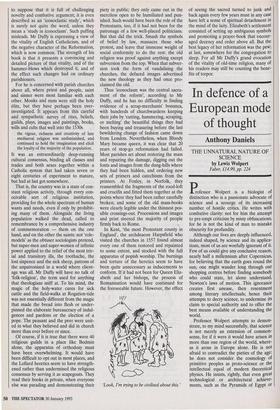In defence of a European mode of thought
Anthony Daniels
THE UNNATURAL NATURE OF SCIENCE by Lewis Wolpert Faber, £14.99, pp. 224 Professor Wolpert is a biologist of distinction who is a passionate advocate of science and a scourge of its increasing number of hostile critics. He writes with combative clarity: not for him the attempt to pre-empt criticism by misty obfuscations, for he is not the kind of man to mistake obscurity for profundity.
Although our lives are deeply influenced, indeed shaped, by science and its applica- tions, most of us are woefully ignorant of it. Few of us could give any conclusive reason, nearly half a millennium after Copernicus, for believing that the earth goes round the sun; one might wander long through our shopping centres before finding somebody who could state, let alone understand, Newton's laws of motion. This ignorance creates first unease, then resentment among literary intellectuals; hence their attempts to decry science, to undermine its claim to special authority and to offer the best means available of understanding the world.
Professor Wolpert attempts to demon- strate, to my mind successfully, that science is not merely an extension of common- sense, for if it were it would have arisen in more than one region of the world, where- as it arose in Europe alone. He is not afraid to contradict the pieties of the age: he does not consider the cosmology of primitive peoples as proto-science or the intellectual equal of modern theoretical physics. He insists, rightly, that even great technological or architectural achieve- ments, such as the Pyramids of Egypt or the Great Wall of China, do not amount to or result from science. Science is so impor- tant, and so overwhelmingly the product of western civilisation, that to admit as much may seem Eurocentric and almost racialis- tic, which is no doubt one of the reasons why so much intellectual effort has gone into denying it; but in fact no unpleasant conclusions may legitimately be drawn from the historical record. Nevertheless, Professor Wolpert displays considerable courage in stating not only this, but other unpopular truths.
Philosophically, he is a naive realist, but not a naive naive realist. While he believes science is a distinct mode of thought and activity, which increases our objective understanding of the world, he proposes no infallible rules to demarcate it from other activities, or to generate important discov- eries. He produces decisive arguments against Karl Popper's oversimplified philosophy of science; he inveighs, again correctly in my view, against those sociolo- gists and historians of science who have tried to show that science is not a special form of knowledge. The fact that scientists sometimes 'massage results', cling passion- ately to outmoded theories for psychologi- cal reasons, and serve the material or political interests of others, does not affect the conclusion that science as an institution has evolved a unique method of approach- ing truth, whose stunning success all rela- tivists must be at a loss to explain.
Enthusiastic about science as he is, Professor Wolpert is not scientistic: he does not claim that science will answer all our problems. He quotes with approval Tolstoy's remark that science cannot tell us how to live: but to decry science on these grounds is like decrying poetry because it will not mend car exhausts. Knowledge is important in life, but it is not everything.
This is not to say that the practice of sci- ence has no spiritual value in itself. To acknowledge one's ignorance, to search hard and honestly for evidence and to change one's mind in the light of it, to sub- ject one's conclusions to the free criticism of others, are noble disciplines requiring a certain intellectual humility, given to only a relatively small percentage of the popula- tion. Scientists are as motley a crew as the rest of humanity, but their collective activi- ty reliably and indefinitely extends the frontiers of knowledge. What is done with that knowledge is not and cannot be the responsibility of science or scientists alone.
The Unnatural Nature of Science is a splendid counterblast to the numerous enemies of science who do not scruple nevertheless to take personal advantage of its discoveries, and who have no sensible suggestions as to its substitute or replace- ment. I can think of no book which explains science better or more vigorously to the layman. Professor Wolpert's prose is clear, direct and euphonious: it seems almost unfair that he should be an eminent scientist as well.











































































 Previous page
Previous page